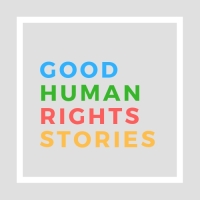Geneva, 24 February 2020
High Level Event during the 43rd Human Rights Council:
Good Human Rights Stories about
“Women Empowerment and Gender Equality“
The EU Delegation together with its partners of the Good Human Rights Stories coalition held another successful high-level event showcasing good examples of human rights policies in Geneva: on the first day of the 43rd Human Rights Council, Ministers, government officials, representatives of international organisations and civil society gathered to listen to good stories from all around the world and to give a refreshing perspective on what’s working. In celebration of the 25th anniversary of the Beijing Declaration and Platform for Action for women’s and girls’ rights, this year’s edition presented examples of good state policies that drive women empowerment and gender equality, stretching over all continents from Georgia and Rwanda, over Argentina and Colombia, to Indonesia and the Republic of Korea.
The event was opened by the President of the Human Rights Council, Ambassador Ms. Elisabeth Tichy-Fisslberger, who praised the Good Human Rights Stories initiative for bringing about a fresh and positive narrative on human rights: “We need events such as the Good Human Rights Stories initiative to take stock of where we are. Real change happens on the ground.”
It was important to remind us of the achievements made towards gender equality, in view of the fact that progress has been slow and uneven and as we aim to fight back such push-backs, added High Commissioner for Human Rights, Ms. Michelle Bachelet: “Let us find many more positive human rights stories. Let us become inspired, learn and amplify them across the world. There are many places where, step by step, we are moving forward.”
When the initiative was launched in New York with the Foreign Ministers of 13 countries and the EU High Representative in 2018, it brought together members that are committed to the advancement of human rights and who strive to show that they change lives for the better in very concrete ways, recalled EU Special Representative for Human Rights Mr. Eamon Gilmore. Merely one and a half years later, the coalition has grown to encompass more members and stories, which are all collected on the goodhumanrightsstories.net website. The Special Representative added another one such story to the collection, and presented the EU’s strive towards gender equality at the workplace, through the EU wide implementation of the ILO’s Convention against harassment and violence at work.
Moderated by the Foreign Minister of Norway, Ms. Eriksen Soreide, the first video story of the event was brought by the Georgian Foreign Minister, Mr. David Zalkaliani: He shared the story of Chinara, who was forced to marry twice before the age of 19, but found help in State-funded shelters which are dedicated to inform, educate, and help victims of forced child marriage in Georgia. The Foreign Minister underlined that “awareness is essential to build knowledge in the best interest of young women. We stay determined to do more for the full realization of rights of every woman and girl.”
The audience hear another story from the Indonesian Foreign Minister, Ms. Retno Marsudi, who told about the role of Indonesian women in the development their peaceful and prosperous society. For Indonesia, “investing in women means investing in peace.”
The Foreign Minister of the Republic of Korea, Ms. Kyung-wha Kang, shared a story of the positive impact on individuals and society as a whole when empowering women with disabilities: In Korea, specific centres have been put in place to enable the “specially-abled” to live independently and free from constraints: “Stories are powerful to inspire action that can change lives,” she said.
Colombia shared the story of Maryani, a former FARC member who now owns a small textile business with the help of a Government program which aims to economically empower specifically women, in acknowledging their crucial role in the stabilisation of areas affected by violence and poverty. Colombian Vice-Minister of Foreign and Multilateral Affairs, Ms. Adriana Mejia, underlined that in Colombia, “all projects aimed at economic reincorporation include a gender perspective.”
Similarly, Argentina presented 3 short stories of women, who benefitted from a fund that prioritises enterprises run by women and which allows them to stay in their often secluded localities in Argentina and contribute to the prosperity of the whole community, by developing tourism related economic activities. This fund generates opportunities in all regions of Argentina, enabling women to create a more inclusive and often more sustainable economic system.
Finally, Rwanda told about how it achieved to rank as the 9th country globally and the first country in Africa to cross the gender gap, by encouraging women’s participation in economic activities. Deputy Ambassador of Rwanda Moses Rugemawas convinced that in this process, “leadership is essential to destruct barriers and stereotypes which constrain participation of girls and women”.
In the subsequent discussion, UN Women ExecutiveDirector Phumzile Mlambo-Ngcuka, Director of the UNFPA Geneva Office Monica Ferro, the German Human Rights representative Bärbel Kofler, and the coalition member New Zealand took the floor to support the initiative and tell their personal short stories and every day victories of women empowerment. The UN Women Director ended the formal part of the event with striking words that remind us of the power of human and women’s rights: “No one else but us will make change happen, we are generation equality.”
The event ended in a surprise performance by three local Geneva-based rappers from the Collectif la Ruelles, who performed several songs about the power of women. Working full time and singing in their free time, their songs reflect difficulties of women at the workplace and bring attention to gender-specific issues that women in our societies encounter day to day, while expressing hope that an equal society is possible.
Rewatch the live broadcast on UN Web TV.
